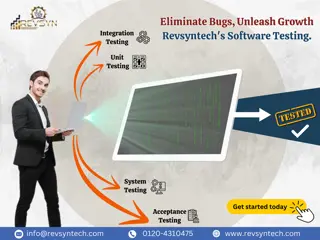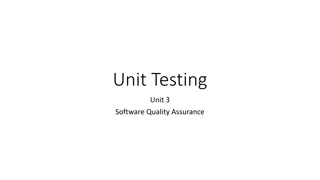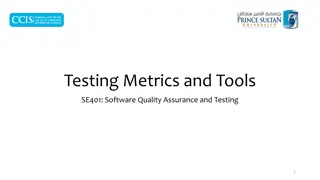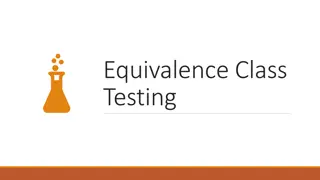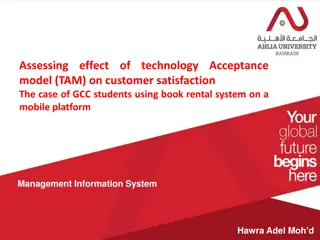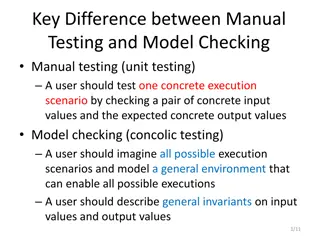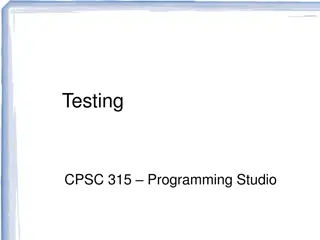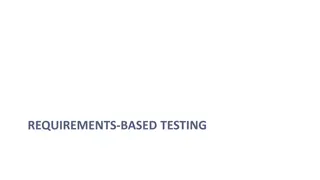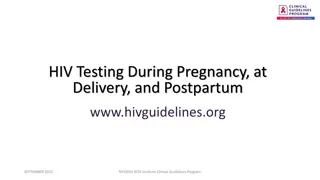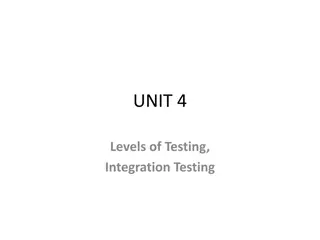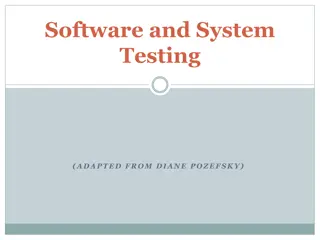Understanding Acceptance of Construction Works
The process of acceptance of construction works involves rescission of contracts, different types of acceptance such as partial, final, and definitive, and the obligations of investors and contractors. It also includes details on partial acceptance according to Art. 654 CC and FIDIC regulations for
4 views • 33 slides
Understanding Autism Acceptance vs. Awareness & Why It Matters
Trainings led by Emily Whaland, LPC, highlight the shift from awareness to acceptance in understanding autism. The sessions focus on fostering diversity, enhancing transition planning, and empowering autistic voices. Rejecting stigma and stereotypes, the agenda encourages active involvement and supp
2 views • 23 slides
Understanding Acceptance and Commitment Therapy (ACT)
Acceptance and Commitment Therapy (ACT) is a therapeutic approach that focuses on psychological flexibility, emphasizing acceptance of thoughts and feelings, commitment to values, and behavioral changes. It aims to help individuals develop skills to navigate life's challenges effectively, promoting
4 views • 20 slides
Eliminate Bugs, Unleash Growth Revsyntech's Software Testing.
Unit Testing\nIntegration Testing\nSystem Testing\nAcceptance Testing\nEliminate Bugs and unleash Growth of Revsyntech's Software Testing.
2 views • 1 slides
Understanding Self-Acceptance Through the Big I, Little i Exercise
Explore the concept of self-acceptance through the Big I, Little i exercise. Discover how the Big I represents your totality, while the little i symbolizes various aspects of yourself. Reflect on your positive, negative, and neutral traits with guidance on filling in the Big I to gain a deeper under
0 views • 5 slides
Software Quality Assurance: Understanding Unit Testing and Boundary Value Testing
Unit testing is a crucial method in software development to ensure each part of the program behaves as intended. It helps detect problems early and provides a written contract for code quality. Additionally, Boundary Value Testing is a black box technique that focuses on input domain testing, with a
1 views • 49 slides
Fundamentals of Software Testing: Quiz on Testing Principles
This quiz focuses on fundamental concepts in software testing, covering topics such as test conditions, testing objectives, differences between testing and debugging, and common failure scenarios. Questions are structured to assess understanding of key principles and objectives in software testing.
2 views • 26 slides
Understanding Software Testing Metrics and Tools
Software testing metrics play a crucial role in evaluating the quality and progress of the testing process. Metrics provide valuable insights into the readiness, quality, and completeness of a product. By measuring attributes such as defects, testing efficiency, and productivity, organizations can m
3 views • 100 slides
Fundamentals of Software Testing Explained
Software testing is a critical process to ensure that software applications meet requirements and are free of defects. It involves various activities such as test planning, analysis, design, implementation, and execution. Testing approaches like the Bing bang approach and Total Quality Management ar
1 views • 48 slides
Understanding Acceptance Sampling in Quality Engineering
Acceptance sampling is a decision-making tool used to accept or reject products based on sample inspections. It involves determining sample size and allowable defects. Attributes and variables play crucial roles in this process, ensuring representative samples are inspected randomly. Homogeneity and
0 views • 48 slides
Public Opinion and Stakeholder Expectations in EU Project HYACINTH
The EU project HYACINTH focused on public and stakeholder acceptance of hydrogen technologies in the transition phase. Led by Prof. Paul Upham from Leuphana University, the project involved surveying participants across European countries to gauge awareness, acceptance, and support for Fuel Cell and
0 views • 20 slides
Understanding Equivalence Class Testing and Its Application in Software Testing
Equivalence class testing is a software testing technique that involves dividing input values into classes for effective testing coverage. Equivalence classes are defined mathematically as subsets of a given set, ensuring partitioning and mutual exclusivity. By applying equivalence partitioning, tes
1 views • 21 slides
Uganda's Successes in Reaching Men with HIV Testing Through Assisted Partner Notification Program
Uganda has successfully implemented an Assisted Partner Notification (APN) program to reach men for HIV testing, addressing the gender gap in testing rates. By utilizing various approaches such as index testing, self-testing, and social network testing, Uganda has achieved significant success in tar
0 views • 12 slides
Assessing Technology Acceptance Model (TAM) Impact on Customer Satisfaction: A GCC Student Case Study
This research project aims to evaluate the influence of the Technology Acceptance Model (TAM) on customer satisfaction, specifically focusing on GCC students using a book rental system on a mobile platform. The study addresses the lack of research on students' preferences for obtaining textbooks and
0 views • 13 slides
Software Testing Foundation Level: Testing Throughout the SDLC Quiz
Explore key concepts in software testing throughout the Software Development Lifecycle (SDLC) with a quiz covering topics like white-box testing in acceptance testing, component testing vs. system testing, and regression testing purposes. Enhance your understanding of testing methodologies with samp
5 views • 17 slides
Importance of Software Testing in Preventing Catastrophic Failures
Software testing is crucial in ensuring the reliability and safety of software systems, as highlighted by catastrophic failures such as the Ariane 5 rocket incident and the Therac-25 radiation therapy machine disasters. These examples underscore the importance of thorough testing in identifying and
1 views • 42 slides
Testing Approach in SCREAM for E3SM Fall All-Hands 2019
Major effort is focused on verification and testing in SCREAM for the E3SM Fall All-Hands. The initiative includes unit testing, property testing, regression testing, and leveraging various tools like Cmake, Python, Jenkins, AutoTester, and GitHub for Continuous Integration (CI). The emphasis is on
1 views • 21 slides
Difference Between Manual Testing and Model Checking
Manual testing focuses on testing specific scenarios with concrete inputs and outputs, while model checking involves imagining all possible scenarios to create a general environment for testing. In manual testing, users test specific execution scenarios, whereas in model checking, users envision and
2 views • 4 slides
Implementation of LFD Testing in Workplace Settings
Introduction to LFD testing in workplaces covers foundational principles, steps to set up a testing service for employees, and roles/responsibilities of stakeholders. Employers must ensure testing is adaptable to different settings, observed/supervised, and recorded. The process involves engaging em
2 views • 7 slides
Zimbabwe HIV Viral Load Testing Overview
Zimbabwe's plan to scale up HIV viral load testing from 2018 to 2020 is outlined, with targets set for each year. The country has made significant progress in expanding its viral load testing capacity, going from targeted testing to near-universal coverage by 2018. Various testing laboratories in Zi
0 views • 9 slides
Antigen Testing in Higher Education Institutions
Antigen testing strategies are recommended for institutions of higher education, with rapid results provided by CareStart COVID-19 Antigen Tests. The testing procedure involves sample collection and interpretation of results, including criteria for validity and different outcomes. Regular testing ca
0 views • 13 slides
Evolution of Antimicrobial Susceptibility Testing in Veterinary Medicine
Antimicrobial Susceptibility Testing (AST) in veterinary medicine has transitioned from limited usage to targeted therapy with species-specific clinical breakpoints. Current challenges include low testing frequency and the need for more reliable, rapid, and cost-effective testing methods. Incentives
0 views • 32 slides
Enhancing Mobile App Testing Strategies for Quality Assurance
Innovative approaches for testing mobile apps are crucial due to the dynamic nature of the app market and increasing user expectations. This research discusses guided stochastic model-based GUI testing, challenges in testing mobile apps, a simple cookbook app for efficient recipe management, and exi
0 views • 39 slides
Understanding Software Testing and Best Practices
Explore the various aspects of software testing, including types of testing like unit, integration, regression, and system testing. Learn about the importance of writing test cases early, testing as you write code, and boundary testing to enhance software quality. Discover the significance of develo
0 views • 40 slides
Understanding Testing in Software Engineering
In the previous session, we discussed various aspects of software engineering, including modeling with UML diagrams, such as activity diagrams, use case diagrams, sequence diagrams, state diagrams, and class diagrams, as well as architecture patterns. Testing was emphasized as a key aspect, highligh
0 views • 35 slides
Understanding Gray Box Testing in Software Development
Gray Box Testing is a software testing technique that involves testing the software with partial knowledge of its internal workings. It combines aspects of White Box Testing and Black Box Testing, allowing testers to check both the presentation layer and the code part of an application. Gray Box Tes
0 views • 14 slides
Unit Testing Legacy Code: Hijacking Singletons for Testing
Enabling unit testing of legacy code requires making changes without altering existing calling code. Singleton pattern poses challenges for testing, but strategies such as hijacking can be employed for effective unit testing. David Benson shares insights on legacy code attributes and unit testing ap
0 views • 39 slides
MQXFA10 Coils Acceptance Review Summary
Overview of the MQXFA10 Coils Acceptance Review for QXFA131 and QXFA132 conducted on September 8, 2021. The review process includes discrepancy reports against specific steps in the traveler, adherence to production specifications and design reports, and addressing critical and noncritical DRs. The
0 views • 33 slides
The Path to Self-Acceptance and Understanding Through Artwork and Reflection
Explore the importance of self-acceptance in discovering one's true identity and the impact of emotions on our well-being. Reflect on images, artist statements, and articles to analyze universal themes and the role of adversity in self-acceptance. Engage in self-exploration through writing and discu
0 views • 24 slides
Understanding Self-Acceptance and Overcoming Stigma
Self-esteem and self-acceptance are distinct concepts, with self-acceptance focusing on embracing all facets of oneself unconditionally. Developing self-acceptance involves stages like aversion, curiosity, tolerance, and allowing. Overcoming avoidance and resistance can lead to self-compassion and g
0 views • 10 slides
ILC Damping Ring Specifications and Recommendations
Specifications and recommendations for the ILC Damping Rings include nominal parameters for injected and extracted beams, positron acceptance criteria, longitudinal acceptance guidelines, energy acceptance with quantum lifetime considerations, and layout components for injection/extraction systems.
0 views • 13 slides
Understanding Requirements-Based Testing in Software Development
Dive into the world of requirements-based testing in software development, exploring main concepts, test levels, testing roles, and the importance of testing your solution and modeling case. Learn about test cases, different testing activities, and the significance of acceptance testing in identifyi
0 views • 16 slides
Guidelines for HIV Testing During Pregnancy and Postpartum
These guidelines recommend HIV testing during pregnancy, at delivery, and postpartum. Testing should be done early in pregnancy and again in the third trimester. Expedited testing during labor is required for certain patients, and syphilis testing is recommended. Pre-exposure and post-exposure proph
0 views • 18 slides
Comprehensive Overview of Fault Modeling and Fault Simulation in VLSI
Explore the intricacies of fault modeling and fault simulation in VLSI design, covering topics such as testing philosophy, role of testing in VLSI, technology trends affecting testing, fault types, fault equivalence, dominance, collapsing, and simulation methods. Understand the importance of testing
0 views • 59 slides
Understanding Unit Testing in Software Engineering
Concept Software is a discipline comprising various code pieces. Testing these codes together is complex but vital in Software Engineering. The process includes early testing like unit tests, pairwise/multiple component testing, module testing, integration testing, user tests, alpha tests, beta test
1 views • 6 slides
Understanding Integration Testing and Levels of Testing
Explore the importance of integration testing in software development, covering topics such as traditional testing levels, the SATM system, goals and purposes of integration testing, testing level assumptions and objectives, software process overview, various approaches to integration testing, and t
0 views • 39 slides
Real Testing Scenario Strategy in a TestOps Environment
Learn about testing tiers, tools for testing challenges, sample architecture for web-based applications, and explore the agenda covering requirements, manual/unit/UI/load/API testing, CI server integration, and reporting. Understand the importance of defining requirements and developing a test strat
0 views • 26 slides
Importance of Software and System Testing
Understanding the critical role of software and system testing in identifying and fixing errors before they lead to major failures. Various types of testing such as functional, usability, performance, and reliability testing are essential to ensure the quality of software products. Different classif
0 views • 52 slides
Automated Unit Testing of Large Industrial Embedded Software using Concolic Testing
Embedded software is growing in size and complexity, especially in industries like smartphone development. Manual testing is often ineffective and inefficient due to corner case bugs and test case generation challenges. To address these issues, automated unit testing utilizing Concolic Testing, a co
0 views • 33 slides
Comprehensive Overview of Software Testing and Strategies
Software testing is a crucial process that involves finding errors before delivering to the end user. The principles and objectives of testing, along with testing strategies and approaches, play a vital role in ensuring quality and reliability in software development. Various testing methods, includ
0 views • 92 slides



